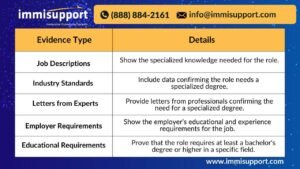
When you receive an H-1B Specialty Occupation RFE (Request for Evidence), it can feel like you’re swimming against the current. These requests require you to prove that the position you’re petitioning for meets the specialized knowledge and educational requirements of the H-1B visa program. And if you’re facing a complex RFE, the process can become even more overwhelming. But here’s the good news — immigration paralegals are your best ally when it comes to responding to these RFEs. They can assist in streamlining the process, ensuring you submit a comprehensive and well-supported response.
In this blog post, I’ll walk you through how immigration paralegals help attorneys like you handle H-1B Specialty Occupation RFEs. By offloading the research, drafting, evidence compilation, and organization, you can focus more on strategic aspects while ensuring a quicker, smoother response.
Researching Occupation Guidelines to Ensure Specialty Occupation Eligibility
One of the first and most critical tasks when responding to an H-1B Specialty Occupation RFE is proving that the job indeed qualifies as a specialty occupation. The role must require specialized knowledge and, typically, a bachelor’s degree or higher in a specific field.
Your immigration paralegal plays a key role in this by conducting detailed research into industry standards, educational requirements, and job duties. They will look up reliable sources like ONet Online, the Bureau of Labor Statistics (BLS), and other industry-specific databases to verify that the position demands the education level required for an H-1B visa.
For example, if you are petitioning for a “data analyst” role, your paralegal will confirm that the position truly demands advanced knowledge and training. This research forms the foundation for responding to the RFE and is critical in demonstrating compliance with USCIS requirements.
Drafting Detailed and Persuasive RFE Responses
Once the paralegal has completed their research, the next task is to draft a compelling response to the RFE. These responses must be precise, addressing each point raised by USCIS in a clear and logical manner.
Your paralegal will help craft the response, ensuring it addresses every aspect of the RFE. If USCIS challenges the need for a specific degree, for example, the paralegal will compile information like industry job postings or letters from experts that show the role requires a specialized skill set.
By carefully structuring the response, your paralegal ensures that all the necessary details are included in an easy-to-read format, reducing the amount of time you’ll need to spend editing and reviewing the draft.
Compiling Strong Evidence Packages for a Solid Response
In addition to drafting responses, the paralegal’s role extends to compiling a complete evidence package to support the claim that the position qualifies as a specialty occupation. A strong evidence package typically includes:

This evidence package should be properly organized and formatted, which is where your immigration paralegal truly shines. They ensure that every piece of documentation is easy to access and clearly supports your RFE response.
Simplify the Attorney Review Process to Save Time
Once the research, drafting, and evidence compilation are complete, your paralegal will present the final package in an organized format. This makes the attorney review process much more efficient.
Instead of sorting through a pile of unorganized documents, the attorney can quickly review the responses and evidence package. Paralegals can even provide summaries or outlines to guide the attorney through the content, ensuring nothing is overlooked.
This streamlined process saves valuable time, ensuring that you’re able to meet deadlines without unnecessary stress.
Real-World Example: Responding to a “Specialized Occupation” RFE for a Financial Analyst
Let’s take a real-world example: Responding to an RFE for a financial analyst position. The USCIS might question whether the role requires a specialized degree, which is a common issue with financial positions.
In this case, your immigration paralegal would:
- Research the financial industry’s standards and gather evidence that the role requires a bachelor’s degree in a specific field.
- Draft a Response that clearly explains why the financial analyst role qualifies as a specialty occupation, citing industry reports and similar case law.
- Compile Evidence such as job descriptions, expert letters, and employer requirements to back up the claims.
- Organize the Review by creating an easy-to-navigate evidence package that allows the attorney to focus on reviewing the content rather than organizing it.
This methodical approach ensures a comprehensive response to the RFE, increasing the chances of approval and reducing delays in the process.
What Did We Learn?
Immigration paralegals play a vital role in responding to H-1B Specialty Occupation RFEs. They help with researching occupation guidelines, drafting clear and persuasive responses, compiling comprehensive evidence packages, and streamlining the attorney’s review process. By outsourcing these tasks to qualified virtual paralegals, you not only save time but also increase the chances of a successful RFE response.
Outsourcing immigration paralegal tasks is a smart choice for busy immigration attorneys looking to maximize efficiency, reduce stress, and improve their chances of success. If you are handling complex H-1B RFEs or any other immigration process, consider the benefits of working with skilled virtual assistants.
What People Are Asking?
1. How can immigration paralegals help with RFE responses for H-1B petitions?
Immigration paralegals assist by conducting research, drafting detailed responses, and organizing evidence to support the specialty occupation claim.
2. What types of evidence should be included in an H-1B RFE response?
Essential evidence includes job descriptions, industry standards, expert letters, and employer-specific educational requirements.
3. How do paralegals streamline the attorney review process?
Paralegals organize and format documents, providing summaries or outlines to make the review process more efficient.
4. Can outsourcing immigration paralegals save attorneys time?
Yes, outsourcing allows attorneys to focus on strategic aspects of cases while paralegals handle the research, documentation, and preparation.
5. What industries commonly require H-1B Specialty Occupation positions?
Industries such as technology, healthcare, finance, and engineering commonly feature roles that qualify as specialty occupations.
Disclaimer
For informational purposes only; not applicable to specific situations.
For tailored support and professional services,
please contact Immisupport, at +1 888 884 2161
Email: info@immisupport.com
Book a Demo: https://immisupport.com/demo/
Rated 4.9/5 by immigration attorneys. If you are looking for Outsourcing services for your Immigration practice, please email 📧info@immisupport.com or call 📞(888) 884-2161.
 Book a demo to build your team today
Book a demo to build your team today













 let’s talk - meet with Immigration Outsourcing expert
let’s talk - meet with Immigration Outsourcing expert